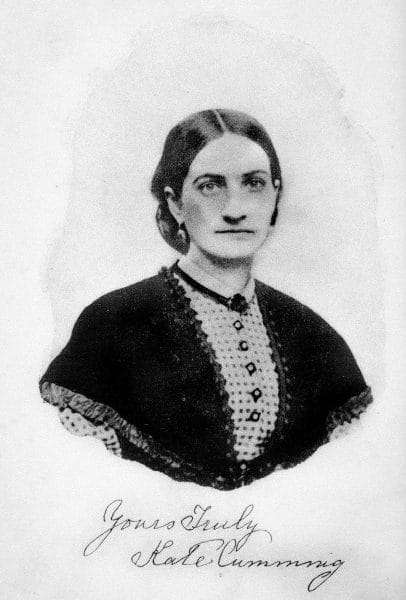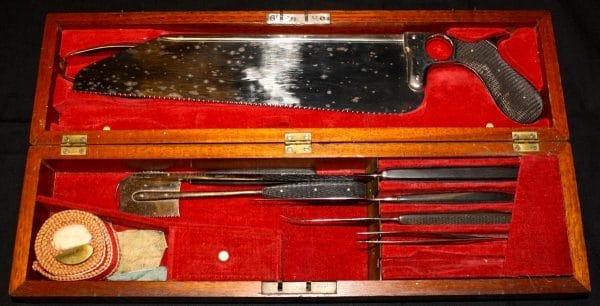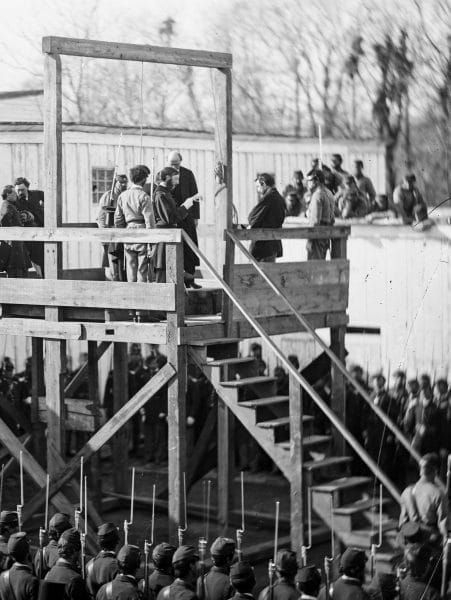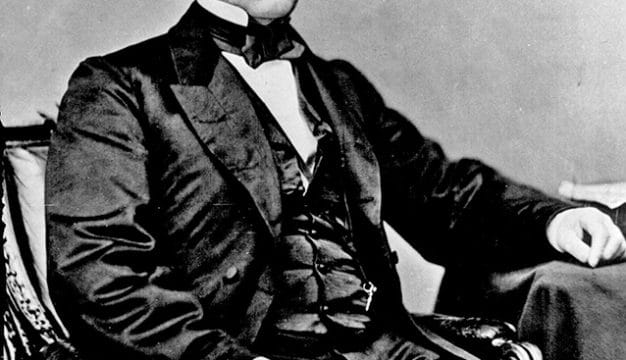Kate Cumming
 Kate Cumming
Kate Cumming (ca. 1828-1909) was a Civil War nurse and diarist whose writings are an invaluable source on southern nursing, Confederate hospitals (particularly those along the western fronts of the conflict), military movements, women’s experiences in the war, and the gradual breakdown of the Confederacy. Cumming was born in Edinburgh, Scotland, between 1828 and 1835. Sometime in the 1840s her father, David Cumming, moved the family to Montreal, Canada, and then to Mobile, Mobile County. Cumming spent her formative years in Mobile and strongly identified herself as a southerner, although she also valued her Scottish roots. She lived a comfortable life until, like many of her female peers, she became caught up in the atmosphere of political rhetoric and romanticized excitement that preceded the outbreak of the Civil War.
Kate Cumming
Kate Cumming (ca. 1828-1909) was a Civil War nurse and diarist whose writings are an invaluable source on southern nursing, Confederate hospitals (particularly those along the western fronts of the conflict), military movements, women’s experiences in the war, and the gradual breakdown of the Confederacy. Cumming was born in Edinburgh, Scotland, between 1828 and 1835. Sometime in the 1840s her father, David Cumming, moved the family to Montreal, Canada, and then to Mobile, Mobile County. Cumming spent her formative years in Mobile and strongly identified herself as a southerner, although she also valued her Scottish roots. She lived a comfortable life until, like many of her female peers, she became caught up in the atmosphere of political rhetoric and romanticized excitement that preceded the outbreak of the Civil War.
Cumming’s mother and two sisters departed for England in 1861 after the war began, but Kate remained at home with her father, David Cumming, and her brother, who enlisted in the Confederate army. As the war intensified and battlefield casualties rose, Cumming joined the home front relief effort, gathering supplies for hospitals. After hearing a speech by the Reverend Benjamin M. Miller, an advocate of female nursing, she determined to volunteer as a nurse at the front. Her family objected, but Cumming eventually joined a party of around 40 women who ventured into Corinth, Mississippi, after the April 1862 battle of Shiloh, in which more than 23,700 Confederate and Union soldiers were killed or wounded or went missing.
physician
 Civil War Amputation Kit
After four months of braving the dismal conditions in Corinth, Cumming briefly returned home. Unlike most of her companions, however, she sought a permanent position in a hospital. Cumming and two other women visited hospitals in Chattanooga, Tennessee, and finally found a willing to accept their services in August 1862. Cumming believed that all patriotic southern women should aid the cause. When southern physicians became convinced of the abilities and value of female nurses, most came to rely on these volunteer women for their labor and management skills. Though Cumming faced the hostility of civilians and some members of her family, who considered hospital nursing inappropriate for women of Cummings’s socioeconomic class, the gratitude of the soldiers convinced her to persevere despite the poor conditions and constant death.
Civil War Amputation Kit
After four months of braving the dismal conditions in Corinth, Cumming briefly returned home. Unlike most of her companions, however, she sought a permanent position in a hospital. Cumming and two other women visited hospitals in Chattanooga, Tennessee, and finally found a willing to accept their services in August 1862. Cumming believed that all patriotic southern women should aid the cause. When southern physicians became convinced of the abilities and value of female nurses, most came to rely on these volunteer women for their labor and management skills. Though Cumming faced the hostility of civilians and some members of her family, who considered hospital nursing inappropriate for women of Cummings’s socioeconomic class, the gratitude of the soldiers convinced her to persevere despite the poor conditions and constant death.
The Confederate medical department was small and disorganized when the conflict broke out, and for the first year and a half of the war, efforts by Cumming and her fellow volunteer nurses filled the gaps in medical care. The Confederacy reorganized its medical department in September 1862, and in recognition of the volunteer nurses’ efforts, and based on statistics showing better survival rates in female-run hospitals in Richmond, Virginia, the Confederate Congress created official positions for such women, who became known as matrons. After receiving a matron position, Cumming remained employed with the mobile hospitals of Dr. Samuel Stout, medical director for the Army of Tennessee. The hospitals followed the military campaigns in Tennessee, Alabama, and Georgia. Throughout this period, Cumming maintained a personal diary that provides the most detailed and honest account of female nursing in the South during the war.
The jobs performed by Cumming and other matrons included managing hospital departments, cooking, foraging in the countryside for supplies, caring for soldiers’ physical and emotional wellbeing, sewing, writing letters, attending men’s deathbeds, and supervising the hospital labor force. Civil War nurses on both sides of the conflict played a critical role in lowering death rates and raising morale in hospitals, but southern women such as Cumming faced increasing hardships and shortages as the war continued.
After the end of the Civil War, matrons and nurses were among the first southerners to publish their observations of the war. Cumming published her diary in 1866 as A Journal of Hospital Life in the Confederate Army of Tennessee from the Battle of Shiloh to the End of the War: With Sketches of Life and Character, and Brief Notices of Current Events During That Period. Because dedicated matrons identified with and supported the Confederate cause and soldiers after the war, they became strident defenders of southern honor. They played a pivotal role in the creation of Lost Cause ideology, a term for the mythologized memory of the Civil War created by southerners to justify losing and to glorify southern soldiers and the Confederate cause despite the loss.
 Execution of Heinrich Hartmann Wirz
Like many of her fellow southerners, Cumming blamed President Abraham Lincoln, the North, and some segments of southern society for the loss. By focusing on the South’s lack of unity during the war, she was able to accept defeat without questioning the cause or her faith in God. Cumming also bitterly denounced the trial of Heinrich Hartmann (Henry) Wirz, Confederate commander of Andersonville Prison in Americus, Georgia, as “the grossest injustice we have yet suffered.” At the prison, nearly 13,000 Union prisoners died from malnutrition, exposure, and disease. Wirz was convicted of conspiracy and murder and hanged in Washington, D.C. He was the only Confederate soldier tried and executed for war crimes.
Execution of Heinrich Hartmann Wirz
Like many of her fellow southerners, Cumming blamed President Abraham Lincoln, the North, and some segments of southern society for the loss. By focusing on the South’s lack of unity during the war, she was able to accept defeat without questioning the cause or her faith in God. Cumming also bitterly denounced the trial of Heinrich Hartmann (Henry) Wirz, Confederate commander of Andersonville Prison in Americus, Georgia, as “the grossest injustice we have yet suffered.” At the prison, nearly 13,000 Union prisoners died from malnutrition, exposure, and disease. Wirz was convicted of conspiracy and murder and hanged in Washington, D.C. He was the only Confederate soldier tried and executed for war crimes.
Cumming annotated and republished her diary in 1895, as Gleanings from Southland. In keeping with her belief in Lost Cause ideology, she dropped passages critical of various southerners’ actions during the war, including cotton planters who refused to grow food and wealthy women who did not nurse, as well as those sections that highlighted the lack of southern unity during the war. Kate Cumming never married and remained devoted to preserving and promoting the memory of the Confederacy. In 1874 she moved from Mobile to Birmingham, Alabama, and wrote, taught school and music, and remained active in her church and the United Daughters of the Confederacy until she died on June 7, 1909.
Further Reading
- Harwell, Richard Barksdale, ed. Kate: The Journal of a Confederate Nurse. Baton Rouge: Louisiana State University Press, 1987.
- Hilde, Libra. “‘Worth a Dozen Men’: Women, Nursing, and Medical Care during the American Civil War.” Ph.D. Dissertation, Harvard University, 2003.
- Schultz, Jane. Women at the Front: Hospital Workers in Civil War America. Chapel Hill: University of North Carolina Press, 2004.



